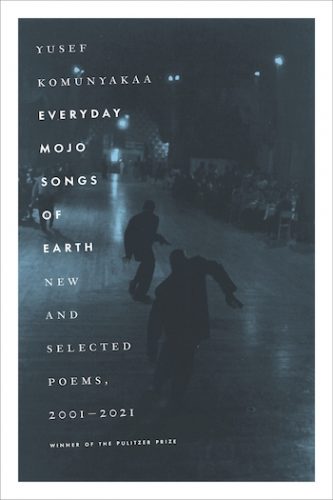Poetry Review: “Everyday Mojo Songs of Earth” — Yusef Komunyakaa, A Poet Who Expresses the World
By Jim Kates
It is always a pleasure to read the poems of a writer who has an ear for language and an eye for form, a voice of their own, and an interest in a world beyond the reach of their own person.
Everyday Mojo Songs of Earth: New and Selected Poems, 2001-2021 by Yusef Komunyakaa. Farrar, Straus & Giroux, 288 pages, $35.
Buy from Bookshop

One could do worse than boast an anticipatory blurb from Johann Wolfgang von Goethe: “Just so with the poet — he deserves not the name while he only speaks out his few subjective feelings; but as soon as he can appropriate to himself, and express, the world, he is a poet. Then he is inexhaustible, and can always be new.”
Speaking in the 1820s (translated here by John Overton) the German poet might have been in agreeable conversation with Yusef Komunyakaa, who said in a 2008 interview, “I feel that the artist or poet — more than the politician or professional soldier — is condemned to connect to what he or she observes and experiences.”
It is always a pleasure to read the poems of a writer who has an ear for language and an eye for form, a voice of their own, and an interest in a world beyond the reach of their own person. I suppose this should be a commonplace expectation for any contemporary poet, but it’s actually a rare combination these days. And so this new collection from Komunyakaa is heartening: it simultaneously satisfies and challenges the reader to move outward.
This poet’s world is wide indeed in time and space, from the 21st-century bayous of Louisiana into the deeps of Classical mythology. His control of different kinds of formality is enviable: he can jump from prose poem to sonnet in a single bound. Within one poem (“Eros”) he can shift comfortably from Bangkok to Boise by way of Hesiod and Camus without missing a beat or losing the reader along the way. This syncretism is a Komunyakaa hallmark:
No, sweetheart, I said courtly love.
I was thinking of John Donne’s
“Yet this enjoys before it woo,”
but my big hands were dreaming
Pinetop’s boogie-woogie piano
taking the ubiquitous night apart.
(“Grunge”)
The only question is not whether or not to read these poems, but how to read them. Although it is convenient to have poems available in chunky collections, reviewers are expected to read straight through the pages and make grand generalizations that encompass many separate works at once. But poems like these cry out to be read one at a time, to be savored individually, rather than treated as syllogisms in an argument or events in a narrative.
Yet that does not mean, in the case of Everyday Mojo Songs of Earth, that the selections from earlier collections feel unmoored. Instead, reading a poem like “Homunculus” —
My ego, if crystallized, would fit
Into the eye socket of a hummingbird.
I may be less than your last thought, but,
Look, here’s my thimble of gin.
— extracted from Talking Dirty to the Gods, a volume I had not previously been familiar with, impels me to seek out that full earlier collection. Each section has its own distinctive character.
The “news” in Everyday Mojo Songs of Earth, however, is in the dozen new poems that begin it. Like “My own two daughters /And granddaughter” in the very first, “A World of Daughters,” the words Komunyakaa serves up
… know how
to work praise & lament, ready to sprout
wings of naked flight & labor.
The praise is for men and women who work “fingers to bone, & borrow / smudged paper, then make promises / to family, unmerciful gods, the unborn;” for boys and girls who “could outrun the sunset / through sage & rabbit tobacco.” The lament is for people like Becky in the prose poem “Shelter,” who “gazes crook-eyed at the sky, a delta sunset tamped down into her bones, & now a limp easing into her left leg.” If you don’t like prose poems, there is the formality of “The Mountain,” a fashionable ghazal, to respond to:
Help is on the way, but don’t question
the music burning toward the mountain.
“Salute the dead but don’t linger,” Komunyakaa urges. The jazz and pop of his lines, the erudition of his references, the breadth of his vision, resonate with echoes of Walt Whitman’s multitudes.
Everyday Mojo Songs of Earth ends with Komunyakaa’s “Requiem,” a poem which he described in 2008 as “unfinished,” and it remains unfinished today — this not an abandonment, but an aesthetic decision and an invitation:
… still singing to heal
wounds, still unable to leave their dead
who never surrendered, & already —
Jim Kates is a veteran of the Mississippi Civil Rights Movement, a contributor to the Mississippi State Museum of Civil Rights, and the editorial co-director of Zephyr Press, publisher of Letters from Mississippi, edited by Elizabeth Martínez.
Tagged: Everyday Mojo Songs of Earth: New and Selected Poems, James Kates

Thank you for opening windows in my Soul. I will have to read more of this man, for beauty lives in his words.